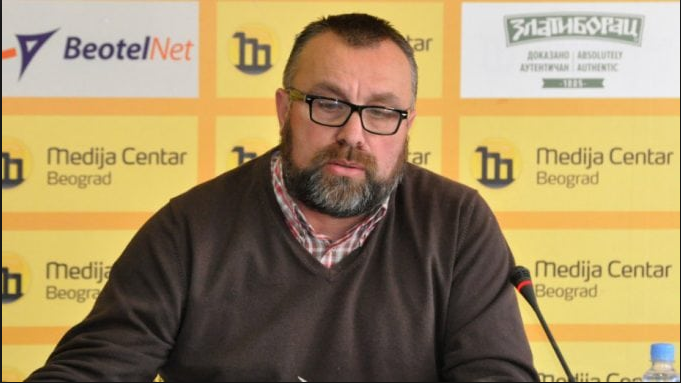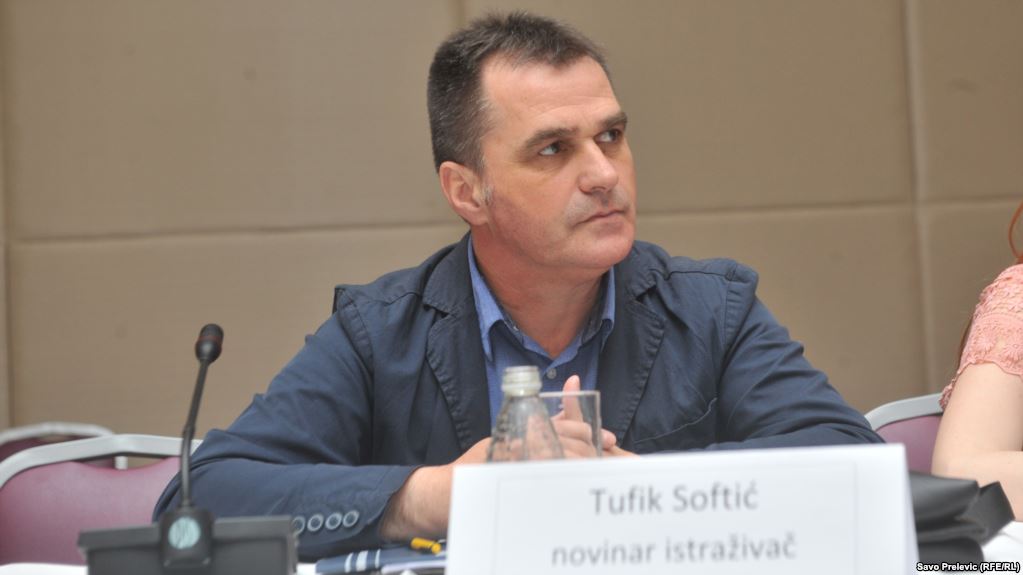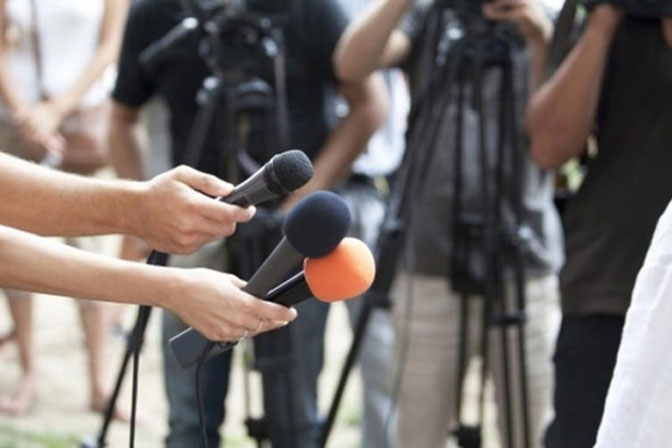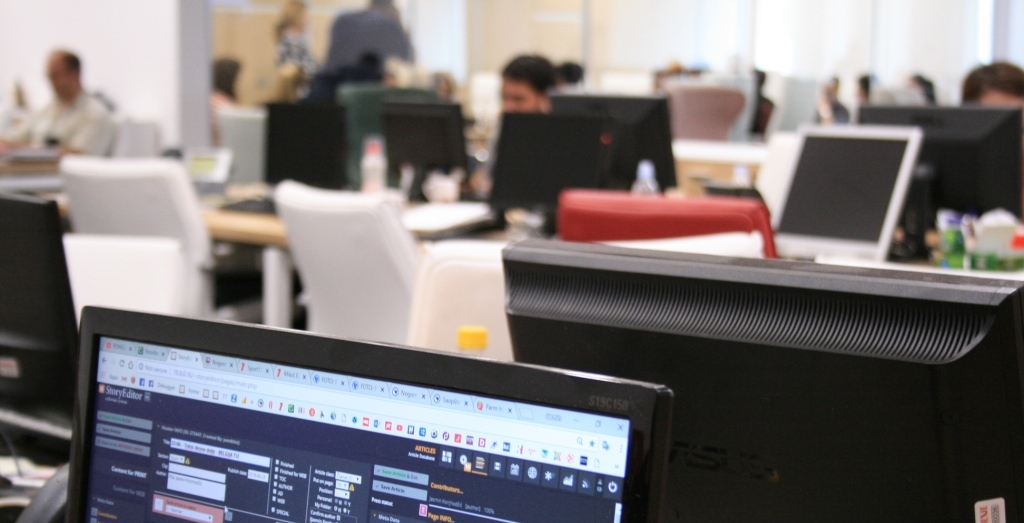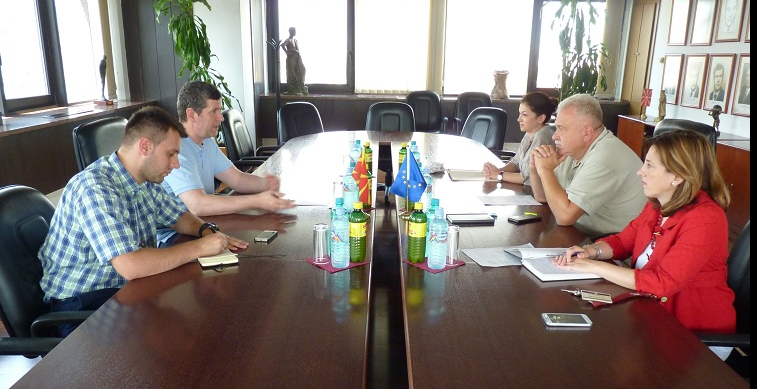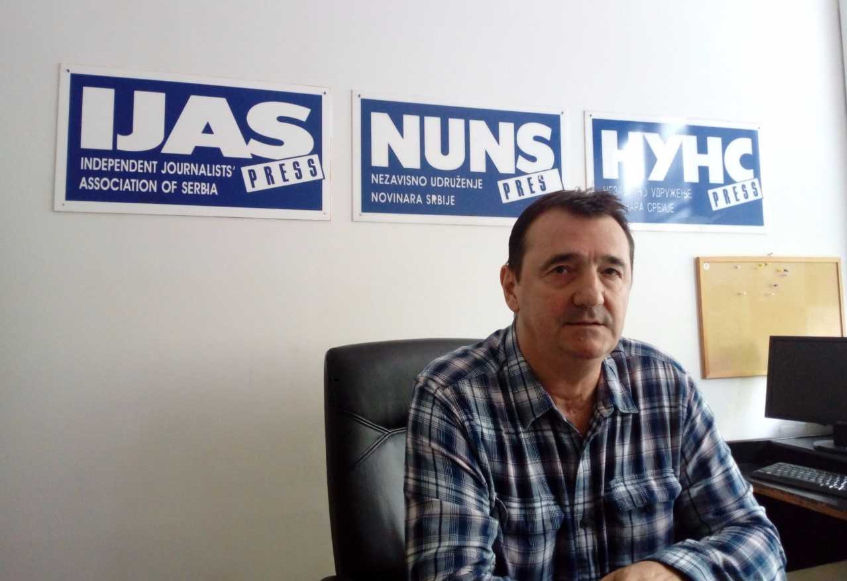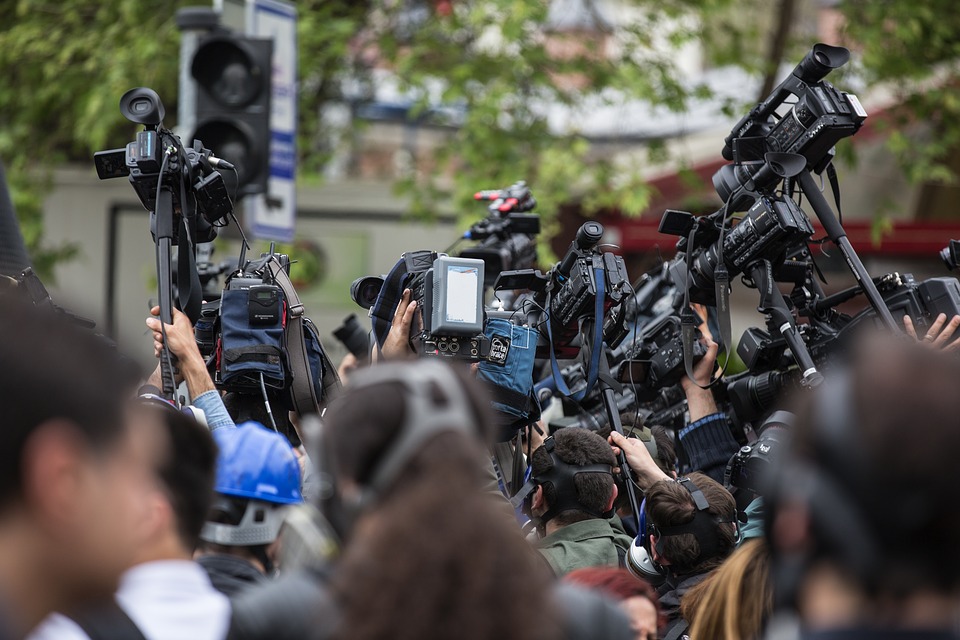BELGRADE, 05.07.2018. – Slaviša Lekić is a straightforward character. President of the Independent Journalists’ Association of Serbia (NUNS) since 2017, he has been fighting for the right to freedom of expression for years. A right that, despite the process of European integration undertaken by Serbia and attempts to align with EU standards, seems to be more and more uncertain, and increasingly at the mercy of the autocracy of Aleksandar Vučić, President of the Republic and leader of the Serbian Progressive Party ( SNS).
Lekić is also a columnist for Serbian newspaper Danas, founder of the Status magazine, and author of numerous books including “Svaka čast Vučić” (Compliments, Vučić), a political biography of the SNS leader. His name is also linked to the television projects “Abuse of Political Influence: Political Parties as the Biggest Employers in Serbia”, “LAZAR”, “Media in Serbia: Chronicle of Decline”, “Fall of the Hague Refugees”, “Zoran Djindjic: HIPOTEKA”, and “How did the people happen”.
We interviewed him on the occasion of the release of his new documentary film “Silom na sedmu ” (Forcing the Fourth Estate), aimed at shedding light on the situation experienced by journalists, especially those critical of the government – death threats, financial pressures, and a latent impunity that undermines the right of expression.
As stated by the European Commission in a 2017 report, the condition of freedom of expression in Serbia has deteriorated drastically…
When the journalists of German TV station ZDF asked me to explain, in the shortest possible way, the condition of the media in Serbia, my answer was very simple: “Funny as an autopsy”.
It is the first time that as many as five organisations in the sector, including Reporters Without Borders and Human Rights Watch, are unanimous in defining the situation of press freedom in Serbia as catastrophic. Not even in the 1990s has it ever been so bad; even the European Commission, which so far had always refrained from openly denouncing pressures on the media, finally came out in a clear way.
The increase in pressures and threats to media and journalists coincides with Aleksandar Vučić’s rise to power of: in the first four years of his government, in fact, pressure on the media has been shamelessly aggressive, with a consequent worsening of the situation.
Some figures: in 2013 there were 23 attacks and pressures, while in 2017 the number rose to 96, by over four times. And only in the first quarter of this year, there were 29 intimidations. With the passage of time, however, pressures have become more subtle: political sabotage and economic restrictions towards the media not aligned with the SNS positions, pressures on advertisers, biased distribution of public funds and, not least, the threats on social media.
The most popular intimidation practice has become the creation of administrative obstacles, that is, frequent inspections and controls on independent media – not with the goal of checking for administrative irregularities, but of closing the outlet. Serbian legislation is so intricate, as experts say, that you can always find a way to shut down a company. And this government is exploiting this possibility to the fullest.
Finally, if we look at the context of Cofinancing for projects of public interest, one of the measures deriving from the first Media Strategy, the pro-government media easily obtain funds and posts in committees for allocation of funds, while the others are left out in the cold. In these conditions, practicing the journalistic profession independently becomes impossible.
How could this deficit be explained in the context of European integration?
We could say that the European Union is partly responsible for what is happening. It is widely believed that, in order to promote this process, Vučić was given carte blanche. According to some, Vučić explicitly requested to exploit the media, both to keep the Radicals at bay and to silence his political opponents. Since, ultimately, this would have been one of the easiest ways to avoid problems along the way.
These, unfortunately, are not just rumors, because in his ascent to the European Union or, to be more precise, in his ascent to absolute power, the first thing Vučić made was to subjugate the media.
The problem became apparent just when we started to implement the measures adopted in the framework of EU integration: although the first Media Strategy of 2011 and the related laws were in line with European standards and regulations, the paradox was soon revealed by which the state, the institution that had promoted them on paper, began to violate them first.
Media reform has collapsed on itself since the beginning.
The privatization of the media, officially “concluded” in 2015, not only appears incomplete, but also seems to have given rise to new forms of political influence. Can we say that a re-nationalisation of the media is taking place?
In Serbia, as in other “banana republics”, the situation is such that the family of Bratislav Gašić, former Minister of Defense and Head of the Agency for Security (BIA), not only owns televisions and online portals, but exercises its influence also on two journalist associations, including DNN, the Association of Journalists of Niš.
The point is that the Secretary General of this association, Danijela Ivanković, is also the editor-in-chief of TV Zone Plus – the owner of which, incidentally, is Vladan Gašić, Bratislav’s son.
As if this were not enough, the Association of Journalists of Niš boasts 3 members in the Commission for the Distribution of Public Funds. Let’s bear in mind that only two seats went to NUNS, while only one went to the Media Association, which represents Serbia’s entire publishing industry. Conclusion of the story: Central Serbia and Vojvodina only have 8 representatives, while two associations of Niš boast 7.
Another case is that of the phantom association of Vranje PROUNS, the president of which, Zoran Veličkovic, has also become the majority shareholder of radio-television broadcaster Vranje (RTV), buying 60% of the shares. In the second round of the tender for public funding, not only has he secured twice the the funds compared to the previous year, but he also managed to buy Bujanovac TV for as much as a Serbian dinar (0.0008 Euro). And it is only the second year that he participates in these tenders.
To top it up, most Vojvodina portals have been bought by Dušan Stupar, former Director General of Public Security in Belgrade and one of the biggest financers of Vučić’s party.
Can the RAEM (Regulatory Authority for Electronic Media) be defined as politicised? Why?
We can say that the RAEM has now become a para-state institution. It should have been created as an independent body aimed at regulating the sphere of electronic media, but in fact it has been politicised from the beginning.
The case of the latest presidential elections was emblematic: the partiality with which the candidates were presented led the citizens themselves to file a complaint. Instead of acting on the basis of these complaints, the RAEM simply forwarded them to the TV stations for comment, but avoided punishing irregularities.
One of the constants, in this relationship between the state and the media, is that now they no longer even bother to cover up the crime. They are so confident they cannot be touched, that they afford themselves to act in the open.
The safety of journalists therefore remains a serious matter. You and your family have recently been threatened…
The case of the death threats against my father because of my journalistic activity proves that the state, if it has the will, has all the means to solve incidents of this kind.
After the first intimidating phone call, I immediately contacted the Adviser for Media of the President of the Republic, to inform him of what had happened. The President called the Interior Minister, the Interior Minister called the Head of the Department for Crimes, and he called me back. All this within two hours. One week after the first intimidation, the perpetrator was arrested and put into custody.
This case is not interesting because it involves me and my family, but because these threats were made from a phone booth – not a phone that you can track down. This person did not show up at my father’s house ringing the bell, and my father did not have a chance to look him in the eye to identify him. Despite these impediments, the police still found ways to arrest him, and quickly.
But if there is no will, it is normal that the situation remains unsustainable: some journalists in particular, including our poor colleagues from the Association of Independent Journalists of Vojvodina, Nedim Sejdinović and Dinko Gruhonjić, suffer daily threats and violence of various kinds, and nobody seems to care. I believe that only Nedim has received 46 threats in the last year: none of these has been investigated.
Then, what happened to Predrag Blagojević, editor-in-chief of Južne Vesti, was emblematic: Blagojević managed to take a picture of an individual who was following and filming him from the car. Two of the eight letters on the car plate, however, were difficult to distinguish and, after over a year of “investigation”, the police still could not trace the vehicle – which is ridiculous because, only based on the type of car and the six digits identified, it would have been possible to trace the vehicle within a day at most.
As for the case of the six journalists attacked during Vučić’s inauguration, everything has been clear from the beginning: on May 31st, 2017, during the ceremony, the journalists were physically assaulted and dragged away with force. When the photos of the incident were published on Danas, Vučić stated sarcastically on television: “I’m really curious to see who will be accused for this”.
Despite the various protest actions promoted by the independent trade associations, the complaints filed by the journalists were definitively rejected by the Public Prosecutor, closing forever any possibility of investigation.
This is the hostile environment we were talking about earlier. After these events, no journalist has had the courage to make public statements about the incident, which reveals the most important symptom: self-censorship. The biggest fear here is fear itself, not the fear of not being paid anymore. Journalists have stopped asking, asking questions, because in Serbia there is no longer the right to protect themselves. This is the saddest thing.
Could you comment on the recent pressures on Južne Vesti, Kikindske, and other local media? It seems that new cases of administrative harassment are taking place, especially against advertisers. Could there be any analogy with the closure of Vranjske?
Among these cases there are important similarities and equally important differences. The fundamental thing that they all reveal, however, is how easy it is to exert pressure at the local level. It is more difficult for these situations to happen in Belgrade: here there is much more solidarity and responsiveness, while in the most provincial parts of Serbia it is really easy to get your hands on the media. What fascinates me, however, is how this government becomes ever more shrewd and innovative in doing so.
The case of Vranjske is almost unbelievable: the weekly has, in fact, suffered constant, unjustified financial pressures to prevent access to public funds, a right enshrined in the Co-financing law.
What makes administrative harassment clear is the fact that, three months after the first check, the Tax Inspectorate ordered a further inspection to investigate the same time frame. The result? All taxes had been paid, but by then Vranjske had been closed forever, after 23 years of respected activity.
In the case of Južne Vesti, however, the Inspectorate did not “just” carry out a financial check, but directly visited the advertisers of the newspaper, threatening them with the same fate if they continued.
Vladan Vukosavljević, Minister of Culture and Information, recently denied the decline of freedom of expression in Serbia, as reported by all the institutes and organisations of the sector. He also added that these reports may be the result of political influence. How do you comment this statement?
I believe that Vukosavljević is the worst Minister of Culture and Information since the beginning of the democratic transition. There have been several idiots to fill this office over the years – feel free to quote me on this – but there has never been a minister as clueless about media as Vukosavljević. Even Velimir Ilić, the mayor of Čačak who physically assaulted a journalist on live television, had a better relationship with the media; at least he understood their essence and, above all, knew how to repress them. This one, however, cannot even do this – his ignorance in the matter is so oceanic that he can only be compared to our Prime Minister Ana Brnabić.
Vukosavljević is nothing but a businessman in the field of culture. His work has nothing to do with the media, and this can easily be deduced from his own statements: in fact, asserting that reports by actors such as Amnesty International or the European Commission are politically influenced is ridiculous. Even the most incompetent of politicians cannot afford to make such a statement. But here in Serbia, unfortunately, such statements are made on a daily basis.


